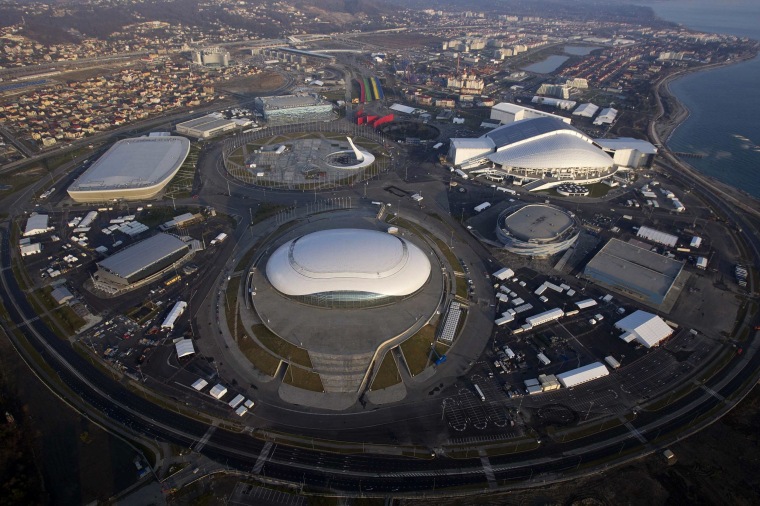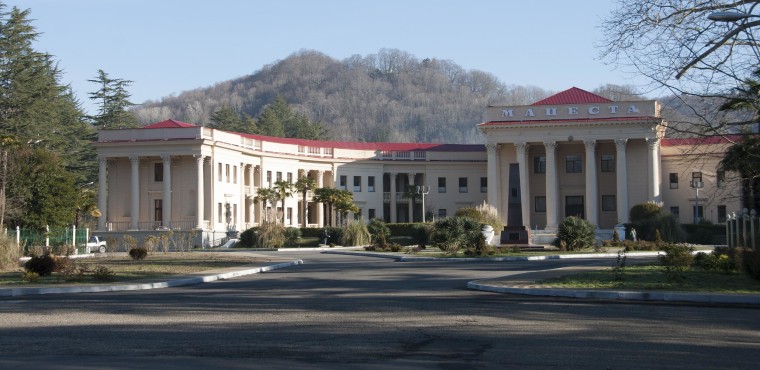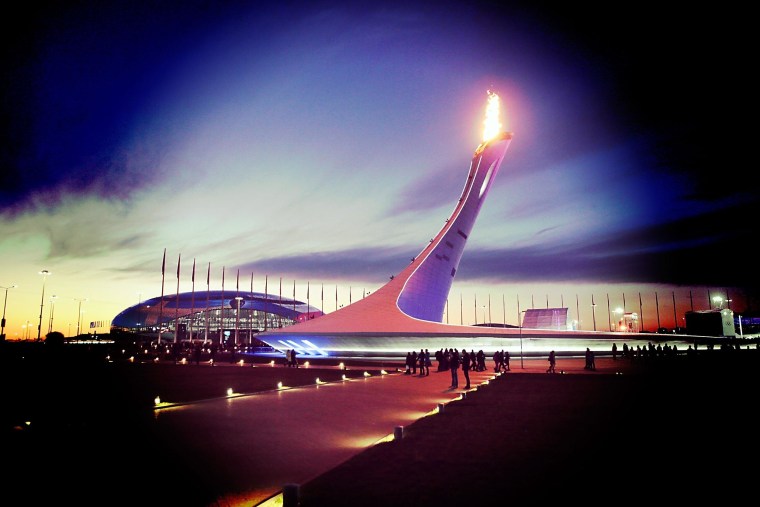SOCHI, Russia — After the Olympic Winter Games were awarded to Sochi in 2007, Russia's president Vladimir Putin said of his country: "This is an acknowledgment of its growing capabilities, first and foremost in the economic and social spheres."
The ongoing games, meant to celebrate a new, re-emerging Russia, are now testing these capabilities, sparking heavy criticism as the country faces new troubles, domestically and abroad.
For Putin, the games and their estimated $50 billion price tag — the most expensive Olympics ever — have turned into a risky bet on an old resort town.
Sochi, after all, is not a metropolis, but a seaside destination. On the shores of the Black Sea, it used to be famous for its sanatoriums and health spas, and the beaches were packed with tourists. But after the Soviet Union fell apart and the borders to the West opened, Sochi lost its cool.
"This is how it looked in the days of the Soviet Union," said Alexander Alasheer, showing a black-and-white photograph of a beach packed with tourists and umbrellas. Alasheer is the supervising doctor at the Matsesta sanatorium in Sochi. The health spa stands as a memorial of a bygone era: marble columns and tiled floors in the central hall built in the 1930s remind one of Soviet grandeur. Russian leaders including Joseph Stalin and Leonid Brezhnev stayed in the VIP building, and just like thousands of other guests over the decades took sulfur baths to improve their health or treat other conditions, or serious burns. In its heyday, about 20,000 treatments were given here every day.
"These days, we are only doing about 1,500 sessions per day at peak season, in the winter it's only a few hundred," said the supervising doctor, as he walked through the empty halls of the bath reminiscing of the bygone times of socialism, when the treatments were free.
"Now, most insurance companies don't cover the treatment," he said. "Out of pocket, each session cost $20. That's expensive if you live on a pension."
These old parts of Sochi hardly appear on television as the world watches the Winter Olympics. Instead, the cameras have shown off of the region's gleaming new sporting venues.
"Putin wants the world to celebrate Russia: Russia's modernizations, Russia's wealth, Russia's achievements," said Tanya Lokshina, Russia program director and senior researcher at Human Rights Watch, adding that the Kremlin has made the games highly political.
"They want to show off. They want the prestige associated with the games," she said. "But prestige always comes with responsibility and it seems that responsibility is actually something that the Kremlin does not want."

Human Rights Watch and other organizations have repeatedly said that Russia's leadership has not been willing to take on the responsibility for the negative effects the games have had on Russian people and the environment: a massive road and rail link connecting the Olympic venues was built through a pristine mountain valley and 2,000 families were resettled. Some of those families haven't been compensated yet. The games have also put a spotlight on the country's harsh anti-gay laws.
In an effort to focus on the grandiosity of the games, the Russian government has mostly overlooked these issues, observers say. Lilia Shevtsova, senior associate at the Carnegie Moscow Center, said with having focused the opening ceremony on Russia's history, organizers were able to appeal to Russia's population.
"Sochi is a glamorous project that is meant to appeal to the people inside Russia," she said. "It distracts the people from their utility bills."
The games also serve the vanity of Russia's leadership and offer citizens a strong fix of nostalgia of the country's once-great power status, she said.
At a recent press conference at Sochi's Olympic Park, Dmitri Kozak, a deputy prime minister and long-standing aide to President Putin, said the Games are a "huge victory" for the country.
"As they say, you don't judge the winners," he said confidently adding that the government investment in Sochi would be recouped within a decade.
Russian fans in downtown Sochi attested to that. Aleksandr Nekrasov, who traveled to Sochi from Syktyvkar in northern Russia, said the games bring out the country's pride.
"The whole country is cheering for the Olympics," he said. "Our relatives call us almost crying and having tears of happiness for the country."
But this newly found patriotism is unlikely to last long, Shevtsova said.
"People are watching glamorous ceremonies in shabby apartments," she said. "So they will sober up quickly."
Russia's economy is slowing, as foreign investment dries up and commodity prices fall. If economic woes worsen, the investment in the Olympic Games will turn from boost to liability, Shevtsova said. The hoped-for shot in the arm for Russia's image — domestically and abroad — could disappear quickly.
"In the short term, people will say 'he did it'," she said of Putin pulling off these games. But Sochi could quickly turn into a problem for his legacy. Shevtsova said the biggest issue is what will happen to the Olympic venues and infrastructure after the games end the world has gone home.
"Sochi will become a ghost city," she predicted. "For ordinary people, it's too expensive, and for rich people, why would they go the Northern Caucasus?"
If the glitzy venues in Sochi's Olympic park do fall into disrepair, they could soon become leftover reminders of Russia's hope for new glory, just as Matsesta Sanitorium's today is a memorial to the country's grand Soviet past.

